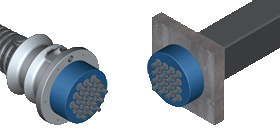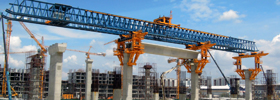Award-winning bridges
BBR post-tensioning for bridges and construction techniques are founded on many years’ experience of creating elegant yet practical infrastructure. BBR Network teams around the world have realized many ambitious and award-winning bridge projects for their clients.
 |
Internal post-tensioned structures
The use of post-tensioning for bridges allows very demanding geometry requirements, including complex curves, variable superelevation and significant grade changes to be met. Bonded internal post-tensioning systems are comprised of tendons from 1 to 73 strands – see BBR VT CONA CMI internal bonded. They have been extensively used in bridge construction applications (both cast-in-situ and precast segmental). The advantages are:
- The tendon can be easily ‘woven’ in order to match exactly the designer’s specifications
- Extremely long span bridges can be constructed without the use of temporary intermediate supports
- Increased load-carrying capacity
- Reduced structural depths
- A fully bonded tendon cannot completely lose its tension following accidents
The CONA CMI internal unbonded PT technology filled with grease or wax offers that a tendon can be re-stressed, monitored and replaced if required.
Extending infrastructure lifetime
 |
BBR post-tensioning is also used to strengthen existing bridges. External post-tensioning tendons, such as the BBR VT CONA CME external or BBR VT CONA CMB band system, are placed outside of the cross-section and transfer the forces to the structure only at the anchorages and deviators. They are not bonded to the structure. Typical applications are for the prestressing of bridges, precast segmental construction and repair and strengthening works. Advantages of this technology are:
- Monitoring, inspection and maintenance can be easily carried out
- Option for restressing, destressing and replacing external cables
- Improved concrete placing and tendon installation
Saving costs by choosing the right bridge construction method
 |
The bridge construction method is an important factor and significant cost-savings can be achieved by choosing the right technique. BBR Network Members around the globe offer not only the right bridge construction equipment, knowledge and resources but also the respective technical support from the preliminary design period to final execution. Basically, five major techniques are employed by the BBR Network, whether cast-in-situ or precast:
- Balanced cantilever
- Advanced shoring
- Launching
- Heavy lifting
- Span-by-span
In addition, a wide range of different or adapted methods are used. Read more about our construction techniques and methods here.
Technologies used
Technology used
CONA CMX
Strong and Versatile
Volume 1: System Applications
See our Downloads page




